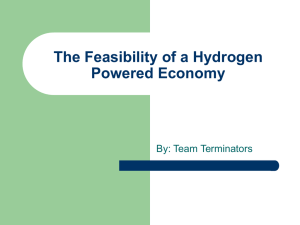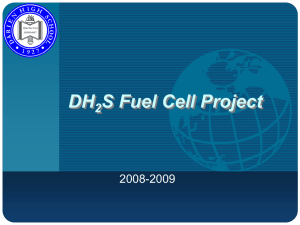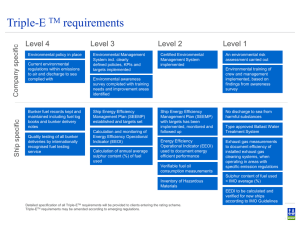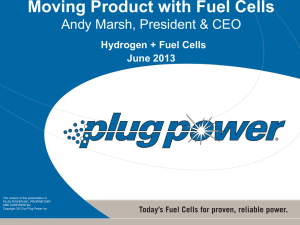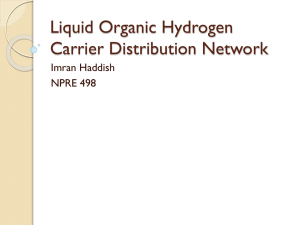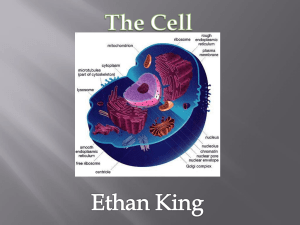Ulster Univ., Prof. Robert Steinberger-Wilckens
advertisement
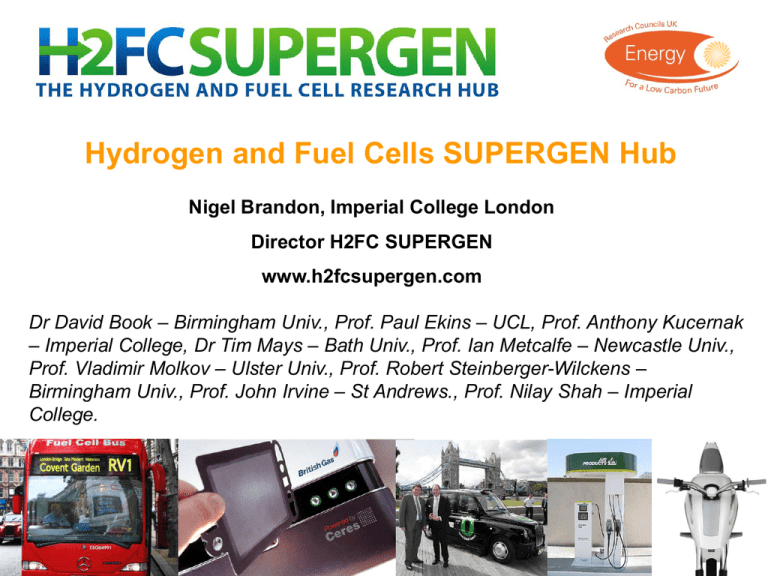
Hydrogen and Fuel Cells SUPERGEN Hub Nigel Brandon, Imperial College London Director H2FC SUPERGEN www.h2fcsupergen.com Dr David Book – Birmingham Univ., Prof. Paul Ekins – UCL, Prof. Anthony Kucernak – Imperial College, Dr Tim Mays – Bath Univ., Prof. Ian Metcalfe – Newcastle Univ., Prof. Vladimir Molkov – Ulster Univ., Prof. Robert Steinberger-Wilckens – Birmingham Univ., Prof. John Irvine – St Andrews., Prof. Nilay Shah – Imperial College. Advisory Board •Sue Ellis (Low Carbon technology manager, Johnson Matthey) - Chair •Phil Whalen (CTO Ceres Power) •Paul Adcock (Director Research and Technology, Intelligent Energy) •Nigel Holmes (CEO, Scottish Hydrogen and Fuel Cells Association) •John Loughhead (Executive Director, UK Energy Research Centre) •Andrew Haslett (Director Strategy Development, Energy Technologies Institute) •Diana Raine (Head Hydrogen Systems Europe, Air Products) •Graham Hillier (Director Strategy and Futures, CPI) •Neville Jackson (CTO, Ricardo plc) •Marcus Newborough (Development Director, ITM Power) •David Hart (Director, E4Tech) •Rowland Travis (Head of Business, Rolls Royce Fuel Cell Systems) •Ray Eaton (Dept. Energy and Climate Change) •Richard Kemp-Harper (TSB) Where will we focus our resources? •We will use our Hub funding in four ways •A core research programme (40%) addressing selected areas of underpinning science in hydrogen and in fuel cells. •A flexible research programme (41%) awarded over time to support new research both within and outside the Hub core partners. •A network activity (16%) to integrate across the HFC community, and to help translate research into impact with external stakeholders. •Support for PhD student training at core universities to help establish a broader ‘cohort’ of PhD students in Hydrogen and Fuel Cells (3%). • Both our core and flexible funding research will take 2 main forms. •The first will provide outputs which include white papers to inform policy makers about the role and potential of hydrogen and fuel cells, and help bridge the gap to other areas in the energy sector. •The second will be underpinning science and technology focussed on addressing and overcoming key technical barriers inhibiting the commercial realisation of the benefits that could arise from widespread uptake of these technologies Hub Structure Education / training Fuel cells / heat engines Management ETI Management Board EC, …. Advisory Board National Networks Associates Knowledge Exchange Research Grand Challenges Systems / infrastructure Science Board International Networks Safety Academic Industry Business Socio-economics Networking TSB Policy RCUK Energy Programme Industry Storage / distribution Outreach Production Science Board •The Science Board comprises full members of the Hub outside the Management Board. Such individuals will either be engaged directly with the Hub through the receipt of flexible research funding, or they will have been invited to become full members via their role as leads of other significant research programmes relevant to the hydrogen and fuel cell sector. •The Science Board offers advice to the Management Board on the research and networking priorities for the Hub, and helps support the peer review process for the award of flexible funding. •Current members of the Science Board are • Bill David, STFC. • Alan Guwy, Glamorgan Univ. • Malcolm Eames, Cardiff Univ. • Peter Bruce, St Andrews Univ. • Gavin Walker, Nottingham Univ. • Plus the PI’s of the new EPSRC H2FC challenge projects. • Plus …… Structure of our Core research activity WP9: Research synthesis WP5: Hydrogen Production WP6: Hydrogen Storage WP7: Polymer Electrolyte Fuel cells WP1: Policy and Socio-economics WP2: Hydrogen and Fuel Cell Systems WP3: Hydrogen and Fuel Cell Safety WP4: Education and Training WP8: Solid Oxide Fuel cell (SOFC) Electrolyser (SOEC) Leads for each area within the Hub •WP 1: Policy and Socio-economics (Paul Ekins, UCL) •WP 2: Hydrogen and Fuel Cell Systems (Nilay Shah, Imperial) •WP 3: Hydrogen and Fuel Cell Safety (Vladimir Molkov, Ulster) •WP 4: Education and training (Robert Steinberger-Wilckens, Birmingham) •WP 5: Hydrogen production (Ian Metcalfe, Newcastle) •WP 6: Hydrogen storage (Tim Mays, Bath) •WP 7: Polymer Electrolyte Fuel cells (Anthony Kucernak, Imperial) •WP 8: Solid Oxide Fuel cells (SOFC) and electrolysers (SOEC) (John Irvine, St Andrews) •WP 9: Research synthesis (Nigel Brandon, Imperial) H2FC SUPERGEN events • UK-Korea H2FC meeting, December 10-11th 2012, Birmingham. • Joint workshop with STFC on hydrogen and fuel cell research – Feb 21st and 22nd 2013. • Second International Symposium on Solid Oxide Fuel Cells: SOFCs and Renewable Energy, 19th April 2013, Imperial College. • H2FC Annual Conference alongside All-Energy, Aberdeen, 21-22nd May 2013. • Anion-Exchange Membrane Electrochemical Device Workshop, Surrey Univ., 25-26th July 2013. How can you become a Hub member? We have two levels of membership of the Hub. The first is Associate Members. Associate Membership will be available to all. Associate members (eligible to receive EPSRC funding) will be entitled to respond to calls for proposals for flexible funding, and will automatically be notified of open events, lectures, seminars and workshops organised by the Hub. The second is Full Membership of the Hub. Full Membership is offered to those who are funded through flexible funding awarded by the Hub, those who bring to the Hub leadership of major programmes relevant to the Hydrogen and Fuel Cell sector – e.g. PIs of the programmes funded under the EPSRC Hydrogen and Fuel Cell Challenge call. Full members are invited to become members of the Science Board.

